Graham Reid | | 5 min read
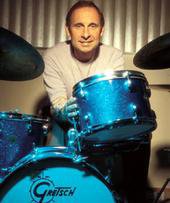
For some reason - perhaps because they
work in a loud profession - you expect drummers to shout. Few do, and
while Joe La Barbera may have started his career in the appropriately
named Thundering Herd led by Woody Herman, the quietly spoken drummer
doesn't shout about it, and doesn't bellow about his illustrious
career either.
For the past decade he has taught
percussion at the California Institute of Arts. He pursues his own
work -- recordings, club gigs at night, tours of Europe in the summer
holidays -- and takes students for private tuition.
In the early 2000s he was touring with
fellow faculty member Larry Koonse (guitar), bassist Tom Warrington
and vocalist Brenda Boykin.
So La Barbera works all the time,
except when he's working?
"Oh yeah, I also practice every
day. I'm still fascinated by the drums and my students bring in stuff
and I pick up on that. I coach two combos and have students, so I am
playing drums all the time."
Growing up in Mt Morris, New York in
the Fifties, he was part of the family band with his parents and his
older brothers Pat and John, who went on to become a famous jazz
saxophonist and trumpeter/composer respectively.
His father taught him drums, clarinet
and saxophone and the polish was put on at Berklee College of Music
in Boston. He reflects on the difference between students in the
Sixties and what he sees today.
"I am noticing the level is much
higher, and I attribute this to Wynton Marsalis. What Wynton did was
made it cool for young people to get back into this music, so
definitely the level is up."
In the Eighties, trumpeter/composer
Marsalis was at the forefront of the neo-conservative movement in
jazz, which took Duke Ellington and Miles Davis as their musical
template. Suddenly jazz was hip and fashionable -- Marsalis adopted
snappy suits and posed for fashion shoots -- and it seemed a viable
career option for young players.
"What's different though is there
are no entry-level jobs where a young person can go out on the road,
bang around and learn something. That's where universities take up
the slack and provide the environment where people can get together
to play. It's totally different from how I learned."
La Barbera learned on the road with
Woody Herman's Thundering Herd, one of the great jazz bands of its
era, although its star was in decline when he joined. It was the
university of jazz life for young players like La Barbera however,
and his longtime friend Alan Broadbent, the former Aucklander whom he
met at Berklee and was also a member of the Herd.
Now a Grammy-winning composer and
arranger for Natalie Cole, pianist Broadbent was then, like La
Barbera, a young guy learning what it meant to be in a band bus night
after night going to the next gig.
"That never changed for Woody, he
always kept that kind of pace. But that's the reality in having a
band that size. You have to work it as much as you can to pay the
bills. At one point we lost the bus because he couldn't afford it, so
we had to rent cars. I don't think Woody's schedule ever changed
much, it was hard but I loved it.
"From the time I was in high
school I'd wanted to play with that band, it represented a real jazz
band as opposed to a dance band. Woody's band was primarily a blowing
band, so I was way into it - and I loved Woody."
At the time Herman -- who died in '87
age 74 -- was permanently on the road because a manager had gambled
away the band's income tax payment and Woody had a big bill. Another
in the Herd was trumpeter/flugelhorn player Chuck Mangione, who went
out with his own band and invited La Barbera to join.
In the mid-Seventies Mangione enjoyed
huge crossover success with the album Chase the Clouds Away and Main
Squeeze. But that was after La Barbera's tenure.
"I've always managed to miss that.
I left Tony Bennett just before he became huge too," he laughs.
"With Chuck it was a struggling jazz group trying to make it. It
was a labour of love and we played jazz clubs and festivals around
the world."
After five years he left and freelanced
in New York,playing with guitarist John Scofield (as with Mangione,
his fame would come after the drummer's stint in his band), Jim Hall,
Phil Woods and many other jazz luminaries.
In '78 he was invited to join the trio
led by pianist Bill Evans, widely regarded as one of the most
innovative, intimate, elegant and exceptional players in jazz. One
encyclopedia described his style as as "a kind of zen on the
piano".
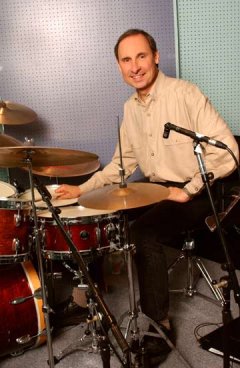 "He was also a wonderful guy, very
personable with a great sense of humour. Not that you would deduce
that from looking at the record covers, they always make him look
serious. Whenever he would do a photo shoot for an album they would
do 15 shots and he'd be smiling in 13, then make him pose for two
serious ones. They'd go for those ones every time.
"He was also a wonderful guy, very
personable with a great sense of humour. Not that you would deduce
that from looking at the record covers, they always make him look
serious. Whenever he would do a photo shoot for an album they would
do 15 shots and he'd be smiling in 13, then make him pose for two
serious ones. They'd go for those ones every time.
"You can be introspective without
being a sourpuss or on a downer. He was really a very warm person. I
learned pretty much everything I know from being with him. He was a
genius and a lot of that is bound to rub off on you, just the way he
would approach the melodic flows of his solos. I definitely picked up
a lot of that."
After Evans' unexpected death in
September 1980, La Barbera took time out, the only period when he
hasn't worked. Early the following year he joined Tony Bennett for a
few years ("That's where I learned how to pace a set, and he
gave 110 per cent every night") and now juggles teaching duties
and his own quintet.
And he has played with saxophonist Lee
Konitz, joined Grammy-nominated singer Karrin Allyson on an extensive
tour of Europe, hooked up with flautist/saxophonist Bud Shank for a
series of workshops, recorded with the acclaimed Swedish pianist Jan
Lundgren . . .
The consummate drummer who can fit in
any context.
"My life has always been so
diverse, and people still call me".

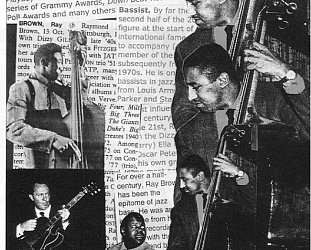


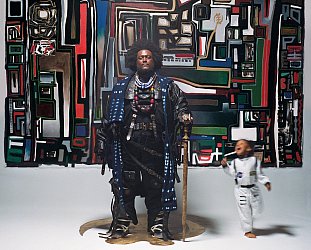

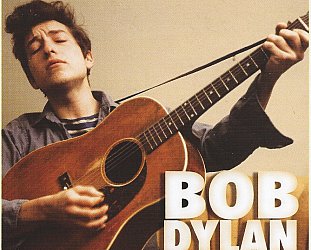
post a comment